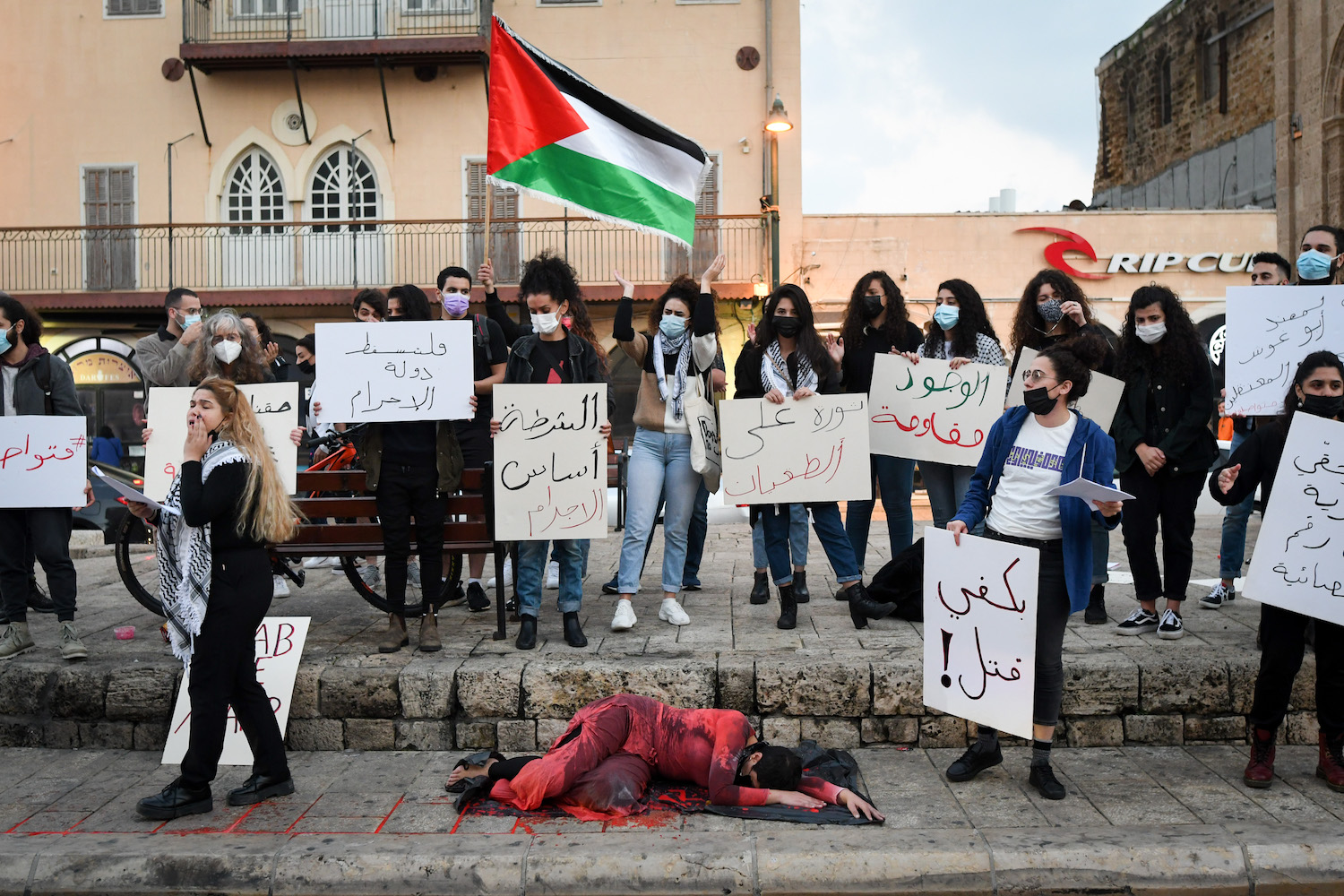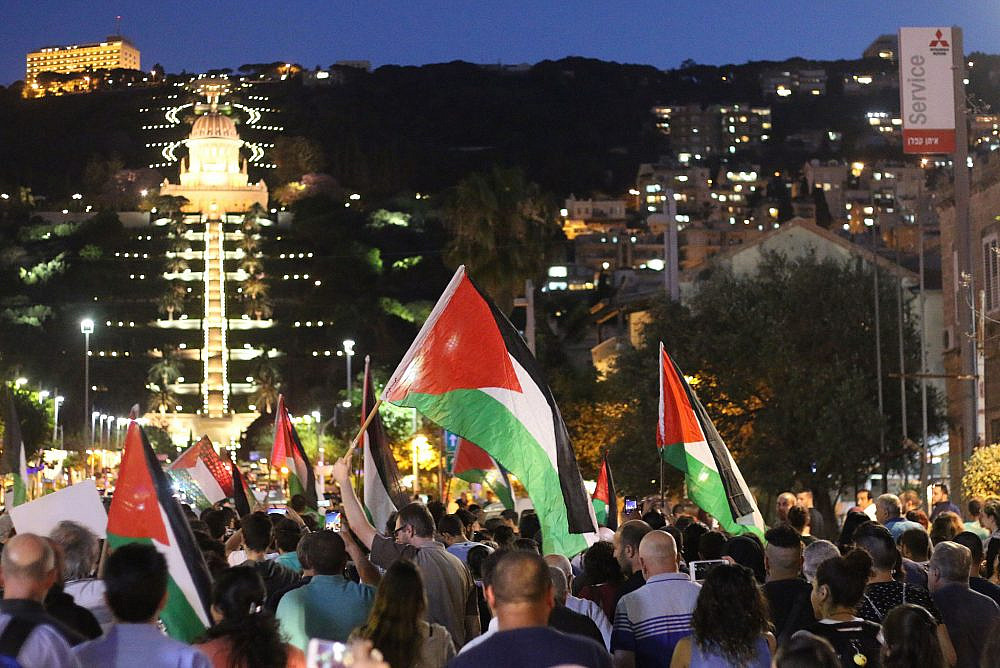Israel’s “government of change” is challenging for anyone trying to advance the position of Palestinian citizens, not the mention the struggle against institutional discrimination against the society, which is as old as the state itself.
On the one hand, the disparities between Jewish and Palestinian citizens have widened greatly on every possible front — housing, employment, education, welfare, industry, personal security, and more. On the other hand, the new governing coalition includes an Arab party, Ra’am, which has shown great willingness to push for a number of projects that will benefit Arab society. Many of these projects have long been brewing in the Knesset, even making it to the desk of former Prime Minister Benjamin Netanyahu, but without results.
There have been countless Zoom calls, consultations, and roundtables addressing the plan to tackle crime and violence in Arab society. A Knesset committee led by Ra’am head Mansour Abbas has been established, and the plan proposed under the previous government is back on the table, upgraded slightly in honor of the coalition agreement.
That there is a sense of change in the Knesset is beyond dispute. Many involved in promoting the rights of Palestinian society feel the momentum shifting and see an increasing openness around conversations between representatives of Arab society and members of the government.

The dispute, rather, is over the explanation for this change: why is everyone all of a sudden courting the best minds in Arab society in Israel? Is it to do with Arabs being in the coalition, or simply the fact that there is a new government after years of stagnation under Likud? Or is the accelerated pace due to the fact that, after two years without one, an approved state budget is finally on the horizon?
Tipping points
Rasool Saada, an attorney who directs the Safe Communities Initiative at the Israeli social change network Maoz and is active in the fight to address crime in Palestinian society in Israel, believes that the shift predates the “ government of change.”
He points to a range of tipping points over the past decade, starting with Israel’s entry into the Organization for Economic Cooperation and Development (OECD) in 2010. Compared to other OECD countries, the poverty and unemployment among Arabs and ultra-Orthodox Jews had effectively put Israel’s socioeconomic status alongside that of developing countries, says Saada. Eager to overturn this image, the government recognized that making sweeping economic change in Haredi society would be more difficult, but found that Arab society was more ready and willing to cooperate, Saada explains. Accordingly, the government began turning its attention to meeting more of Arab society’s needs — primarily to serve its own economic interests.
The second tipping point came in 2015, when Israel passed Resolution 922, a five-year economic plan for Arab society. The third was the temporary political power accumulated by the Joint List, the united slate of four Arab political parties, when it gained 13 seats in the March 2015 elections.
Not all areas of development advanced equally, says Saada. While Arab representatives found some success and influence in the economic and academic fields, when it came to addressing crime and violence, insights from Palestinian society made less of an impact: the Israeli police remained adamant about their plans to recruit more Arabs to the force and to open additional police stations in Arab villages. The implementation of Resolution 922, meanwhile, ran into significant problems, leading to more modest outcomes than originally anticipated, Saada says.
Nonetheless, Saada sees the Bennett-Lapid government as a rare opportunity due to the combination of “political interest in safeguarding the coalition and the economic interest of the treasury.” The result, he explains, is “a push that we all feel on the ground. Each side knows that this is likely a one-time and brief situation, in which the stars have aligned for the good of both sides in Israeli society.”
Maintaining political stability
Over the past months, the government has recruited and trained new economic consultants, strategists, and other professionals to “implement government programs” that are meant to help Palestinian citizens and organizations learn how to access, receive, and take advantage of the state’s plans.
Groups such as Sikkuy – The Association for the Advancement of Civic Equality, the Abraham Initiatives and the Arab Center for Alternative Planning have teamed up with advisory authorities to strengthen work being carried out with government offices and understand how to get the resources that are routinely granted to Jewish organizations and local authorities.
For example, the workforce of the Professional Forum of the Heads of the Arab Local Authorities (which have immense power over budgets and political decisions in Palestinian localities inside Israel) has doubled in the past two months, including adding a planning and housing consultant, two economic consultants, and an expert dealing solely with the local authorities in the Naqab/Negev, among others. Unfortunately, all of these new recruits are men, sparking outcry from feminist organizations who consult on gender issues.
The funding for these professionals, though, has not been provided by the state, but by philanthropists based overseas, including the New Israel Fund, liberal American Jewish donors, foreign governments, and the European Union. For these sponsors, strengthening the Palestinian population in Israel, and reducing the gaps between Jewish and Palestinian citizens, is necessary to maintain political stability in the country.

As one donor told me two years ago, “I understand now that there are Arabs in the Jewish state, but don’t you think you’re making too much noise for a million people?” I replied: “You do understand that noise which makes its way into an English-language position paper is preferable to the noise Arabs are liable to make if this discrimination isn’t addressed?” Indeed, the violent events of May are a bitter taste of what can happen here if things don’t change.
Accordingly, there has been a rare meeting of interests between Palestinian civil society in Israel and liberal-democratic Americans and Europeans, who welcome Jewish-Arab partnership in “the only democracy in the Middle East,” and who don’t miss the Likud government and its romance with Trump-era Republicans.
When foreign donors set the tone
Naila Awad, the director of Women Against Violence, agrees that there is a certain euphoria among liberal American donors — especially those who want to see this government coalition hold, given that it houses Labor and Meretz, their natural political partners in Israel.
Awad further acknowledges that the new coalition brought with it a “clear trend of money flowing into organizations dealing with policy change, winning rights, promoting Arab society and the economy, and the integration of the Arab population into the Israeli economy.”
But, Awad warns, “civil society groups need to stay alert to the agendas of every fund and donor, and not agree to shifting our work away from the national conversation, from the struggle against the occupation, and the struggle for full equality, which are presented to us as a far-off goal that isn’t relevant right now.” Instead, she continues, donors want these organizations to “focus on what this government has to offer.”
Even so, Awad continues, civil society groups “have become very important, with government officials getting the green light to approach them and learn about different issues on the ground.”

Reda Jaber, an attorney who heads Aman – The Arab Center for Safe Society, says that he senses change in the air and sees a recent coming together of Palestinian society and government representatives. “The change is a fact,” he says, “and we need to seize the momentum.”
“Although there are inherent dangers in the national discourse and in our agenda as a Palestinian minority in the long term, something has shifted in Israel, which is in many ways revolutionary,” Jaber continues. “After 70 years, an Arab party is in government — how can that be ignored? The police spokesperson’s messaging to Arab society is less hostile. We still have many reservations about the government’s crime-fighting plan, but the Ministry for Internal Security is taking responsibility, which I commend.”
Yet Jaber also worries about the government’s hidden aims. Pointing to education as an example, he explains that Palestinians want to teach the Palestinian narrative and history, but that doing so in line with the government’s objectives would prove difficult. “The investment in Arab education intentionally excludes anything related to identity and belonging, whether to a place, a people, a language, or a culture,” he explains.
Stressing that Israeli planning for Arab society is still “based on an ideology of control,” Jaber warns that NGOs are being forced to take whatever they can get, calling the situation “dangerous.”
Representation isn’t everything
Eran Nitzan, an economist, former deputy head of the Finance Ministry’s budget division, and one of the architects of Resolution 922, is convinced that while the cooperation between Ra’am and the Bennett-Lapid government is important, its impact is relatively minor.
Nitzan dates the start of this political shift to profound changes that began in Arab society years ago, which legitimized the advancement of economic plans. Political cooperation and the coalition agreement brought representatives’ voices to the table, he says, “making life easier for treasury officials who prepare the state budget.”
Increasingly, he says, he has seen elected officials listening to Arab researchers and relying on their data, and lauds the “change in attitude.” Nitzan believes that this shift has been helped along by an expansion in “professional and political leadership” in Palestinian society.
At the same time, however, Nitzan does not see the current coalition — and Ra’am’s presence within it — as all that consequential. He points to the existing presence of Arabs in the Knesset prior to the current coalition, who “pressured the government from the outside, just like other pressure groups — climate activists, for example, or settlers.”

“Political representation is very important,” Nitzan continues. “Having representatives on the inside can be critical, but the main thing is to keep pressing forward, not to give up or despair, whether inside the government or not.” The government’s attitude is shifting too, he adds, although he is frustrated that Resolution 922 has not been fully implemented.
Amjad Shbita, co-executive director of Sikkuy, also believes that Ra’am’s presence in government, alongside Meretz and Labor, is speeding up decision-making around initiatives to benefit Arab society. But he also notes that this has been a longstanding job of government officials, who finally decided not to ignore the needs of Arab society, as well as civil society organizations such as Sikkuy, who have worked hard at preparing the government decisions.
“We have mobilized more around strengthening local government, and less around strengthening Ra’am’s participation with other coalition parties,” Shbita says. His organization, he adds, has not seen the influx of cash from liberal philanthropists that other groups have received.
Seven decades of deprivation, neglect, and discrimination have created profound gaps between the state’s Palestinian and Jewish citizens. The challenges before Palestinian society are many, yet many in the community also agree that, for the first time in years, there is significant potential for advancing the interests and basic rights of Palestinian citizens.
A version of this article was first published in Hebrew on Local Call. Read it here.



